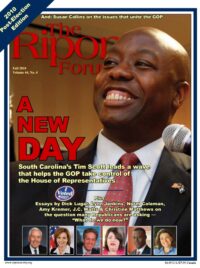
As I write this essay, the election is just days old. The post-mortem is underway – from major media to kitchen tables, everyone’s talking about what happened and what it all means. Certainly, we Republicans are enjoying the dissection more than the Democrats.
The American people have made a powerful statement, one that will resonate from Congress to state capitols to town councils.
Electoral politics is the ultimate free market of ideas. Millions of independent decisions made in voting booths throughout the country demonstrated a clear preference for a brand of government that is less expensive and less intrusive, more effective and more accountable.
Republicans have been deemed best able to provide that kind of government. Now we must deliver.
One of the lessons of Election 2010 is that the country has rebuked a Democratic Administration and Congress for failing to focus on jobs and the economy, and for running up an unsustainable debt. But another lesson is that the American people are tired of too many in Washington being more interested in scoring political points than in solving problems. But the citizens of this country expect us to solve problems, and that is what we must do.
With our mix of moderates and conservatives, the Republican Party has the ability to lead the way. Our big tent can be the place where those with differing views on an issue can sit down together, discuss with civility, negotiate in good faith, and attempt to reach a solution. And our tent is spacious enough to welcome those of the other party who want to join us in rational, respectful discourse.
With our mix of moderates and conservatives, the Republican Party has the ability to lead the way.
We should all listen to the clear message sent by the American people; our priority must be restoring our Nation’s fiscal health.
This mega-issue consists of improving the current state of the economy as well as addressing the annual deficits Washington is running up and the soaring national debt.
With Republicans leading the way, our first priority must be to adopt policies that will get the economy moving again and put Americans back to work.
We should begin by extending the 2001 and 2003 tax relief provisions that are scheduled to expire at the end of this year. Otherwise, Americans will face one of the largest tax increases in U.S. history. In my state of Maine, the average middle-income family will see their taxes jump by about $2,900. Surely we can agree that the midst of a deep recession is no time to raise taxes on America’s families and small businesses.
As I talk to small business owners across the State of Maine, they tell me that uncertainty about taxes is preventing them from hiring more employees and investing in their businesses. Let’s end that uncertainty.
We should begin by extending the 2001 and 2003 tax relief provisions that are scheduled to expire at the end of this year.
Second, surely we can also agree that the current deficits are unsustainable and the accumulating debt – now more than $13 trillion – poses a great threat to our Nation’s future prosperity.
The cost of entitlement programs continues to escalate. Like a perfect storm, rising Social Security and Medicare expenditures soon will collide head-on with the cresting wave of retiring Baby Boomers.
This is an irrefutable fact. Yet in the recent campaigns, candidates who dared to suggest any ideas on entitlement reform were often cast by their opponents as villains bent on the destruction of our elderly. We can prevent this fiscal disaster only if we first agree that entitlement reform can be discussed thoroughly and thoughtfully.
While entitlement programs and interest on the national debt comprise more than 60 percent of the budget, we also must tackle discretionary spending. I have advocated a bipartisan proposal to freeze 2011 discretionary spending at last year’s level. Carried forward, this step in the right direction would save $296 billion over the next decade. This overall freeze would compel the federal government to make the difficult decisions, to set priorities, and to focus on effectiveness and efficiency.
The November 2nd elections gave Republicans much to celebrate. But we recognize that the American people presented us with a challenge – to ensure our Nation’s solvency and to guarantee that future generations of Americans will inherit a nation that is strong and prosperous.
On that we must agree.
Susan Collins represents the State of Maine in the United States Senate.




